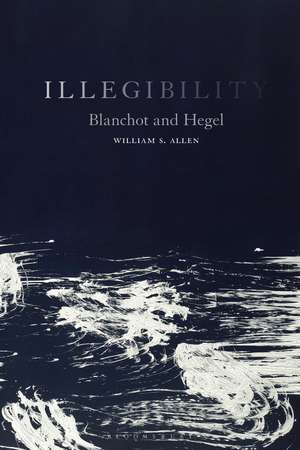Illegibility: Blanchot and Hegel
Autor Dr William S. Allenen Limba Engleză Paperback – 25 ian 2023
| Toate formatele și edițiile | Preț | Express |
|---|---|---|
| Paperback (1) | 191.67 lei 6-8 săpt. | |
| Bloomsbury Publishing – 25 ian 2023 | 191.67 lei 6-8 săpt. | |
| Hardback (1) | 569.13 lei 6-8 săpt. | +120.70 lei 6-10 zile |
| Bloomsbury Publishing – 30 iun 2021 | 569.13 lei 6-8 săpt. | +120.70 lei 6-10 zile |
Preț: 191.67 lei
Preț vechi: 249.53 lei
-23% Nou
Puncte Express: 288
Preț estimativ în valută:
36.68€ • 38.42$ • 30.40£
36.68€ • 38.42$ • 30.40£
Carte tipărită la comandă
Livrare economică 09-23 aprilie
Preluare comenzi: 021 569.72.76
Specificații
ISBN-13: 9781501376788
ISBN-10: 1501376780
Pagini: 264
Dimensiuni: 152 x 229 x 25 mm
Greutate: 0.35 kg
Editura: Bloomsbury Publishing
Colecția Bloomsbury Academic
Locul publicării:New York, United States
ISBN-10: 1501376780
Pagini: 264
Dimensiuni: 152 x 229 x 25 mm
Greutate: 0.35 kg
Editura: Bloomsbury Publishing
Colecția Bloomsbury Academic
Locul publicării:New York, United States
Caracteristici
A detailed discussion of the relation between thought, language, and the infinite
Notă biografică
William S. Allen (PhD, University of Warwick) is an independent researcher at the University of Southampton, UK, and the author of the following books: Adorno, Aesthetics, Dissonance: On Dialectics in Modernity (Bloomsbury, 2022); Noir and Blanchot: Deteriorations of the Event (Bloomsbury, 2020); Blanchot and the Outside of Literature (Bloomsbury, 2019); Without End: Sade's Critique of Reason (Bloomsbury, 2018); Aesthetics of Negativity: Blanchot, Adorno, and Autonomy (2016); and Ellipsis: Of Poetry and the Experience of Language after Heidegger, Hölderlin, and Blanchot (2007).
Cuprins
AcknowledgmentsAbbreviationsIntroduction: Marks of Experience1. Roussel and Lautréamont2. Derrida: Infinite Outline3. Hegel: Uneasy Infinite 4. Blanchot: Nothing Doubled5. Blanchot: Wholly ImpossibleReferencesIndex
Recenzii
[Allen's] work offers a forceful corrective to the simplifications or even outright parodies of Hegel one sometimes finds in work on Blanchot and many of his fellow-travellers in twentieth-century French literary philosophy ... Allen's book is unlikely to be surpassed as a philosophically robust and clearsighted guide to the entretien infini between Hegel and Blanchot, philosophy and literature, and negation and negativity.
How does one approach a written work that problematizes the regulative ideal of a legible book? This question is associated with Derrida's deconstruction of Hegel. As William S. Allen demonstrates in this fascinating study, it was posed in a unique way by Blanchot, whose own engagements with Hegel invite us to rethink the relation between the terms différance and aufheben.
Illegibility: Blanchot and Hegel applies near-exhaustive knowledge, and laser-like insights, to develop a reading of Hegel through Blanchot, with judicious reference to other thinkers such as Derrida. Hegel stands as a figure for a type of double, even dialectical reflection, in which Blanchot found inspiration even as he challenged and rewrote the Enlightenment philosopher's thinking. Allen's profound and sustained analysis, based on careful attention to texts, represents what the humanities is best able to do, and he proceeds by means of a nonetheless rigorous scientificity that should be the gold standard for researchers in any field.
How does one approach a written work that problematizes the regulative ideal of a legible book? This question is associated with Derrida's deconstruction of Hegel. As William S. Allen demonstrates in this fascinating study, it was posed in a unique way by Blanchot, whose own engagements with Hegel invite us to rethink the relation between the terms différance and aufheben.
Illegibility: Blanchot and Hegel applies near-exhaustive knowledge, and laser-like insights, to develop a reading of Hegel through Blanchot, with judicious reference to other thinkers such as Derrida. Hegel stands as a figure for a type of double, even dialectical reflection, in which Blanchot found inspiration even as he challenged and rewrote the Enlightenment philosopher's thinking. Allen's profound and sustained analysis, based on careful attention to texts, represents what the humanities is best able to do, and he proceeds by means of a nonetheless rigorous scientificity that should be the gold standard for researchers in any field.
